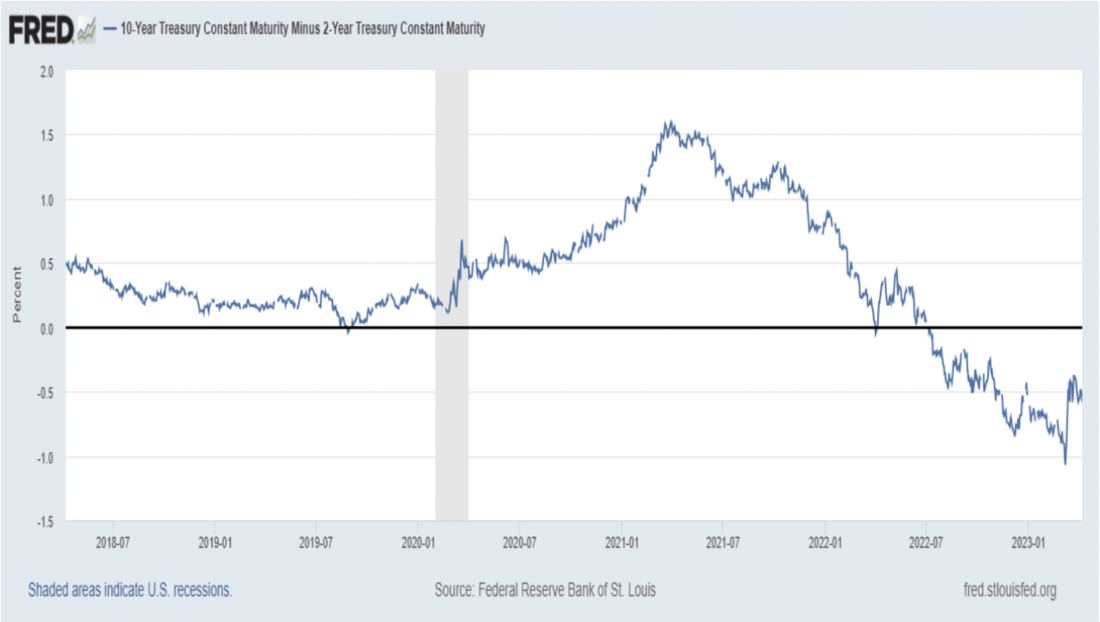|
The fear of inflation is trumping the risk of a recession at this point in time as government’s continue to fight inflationary pressures by pushing interest rates ever higher. But if the Canadian government is successful at getting inflation down to their goal of a range near 2%, then today’s bonds look like a good bet at 3.8% on average for 1 to 3 year terms. Remember only 3 years ago these same bonds yielded .46%. But the primary appeal for bonds is their safety and security should corporate earnings falter. As Reuters reported on March 7th the US Treasury yield curve was at “its deepest inversion since 1981”. Considering we had a recession in 1982, the current yield curve may be a harbinger of bad news to come. So where is the Good News? Valuations are becoming attractive. I like to look at bank stocks as the “canary in the coal mine” as they are highly leveraged to the health of the economy. The recent collapse of two regional banks in the United States and Credit Suisse collapsing from a high of 7 swiss francs over 12 months to .82 CHF at the end of March has obviously spooked investors in bank stocks, where TD has dropped from roughly $100 per share at the high to a low under $76.50 in March. With a book value near $61 this is near the low end of its historic valuation which has ranged from a 25% discount to book in 1981 to 3 times book at the peak in 2007. CIBC shares are trading just above their $55 book value at just over $57 on March 31st. Other than the National Bank of Canada, shares of the major banks have tumbled between 5% to 23% over the last 12 months. If you held a Canadian monthly income fund, which is generally sold as a safe and secure investment (it holds primarily Canadian bank shares), you likely took a beating this quarter. Again, the good news is that the pain is likely behind us and with current interest equivalent yields of roughly 7.5% available on Canadian bank stocks with dividends that historically grow. This beats government bond and term deposit yields significantly. And then there's oil? Along with mining and metals prices, oil prices have peaked back up thanks to OPEC. As Reuters reported yesterday “both benchmarks jumped more than 6% this week after OPEC+, the Organization of the Petroleum Exporting Countries (OPEC) and allies including Russia, surprised the market on Sunday with a pledge of production cuts.” This may put a wrench into Canada’s plans to stop raising interest rates as inflationary expectations rise. I was hoping that investors could continue receiving currency gains by holding international funds but if oil prices remain sticky and high, our dollar may go back up again. It has dropped from 80 cent to 74 cents per US dollar over the past 12 months which has given Canadians holding US dollar denominated funds a headwind of some 8% over that period.
I continue to be a big fan of Fidelity’s Large Cap fund where Dan Dupont can hold a large percentage of his funds in oil stocks if he still sees value there. At one time the largest holding in his fund was Suncor. Now, maybe he has switched to bank stocks? In any case, buying what is not popular and holding cash when he cannot find value has worked well. Leave a Reply. |
Archives
April 2024
Sign up for our Newsletter here.
|
|
Contact
Suite 256, Bonnie Doon Shopping Centre 82 Avenue & 83rd Street Edmonton, Alberta T6C 4E3 Phone | (780) 433-5449 |
Copyright © DW Good Investments Co. Ltd. 2015
|
Website design by Robin Design 2015
|

